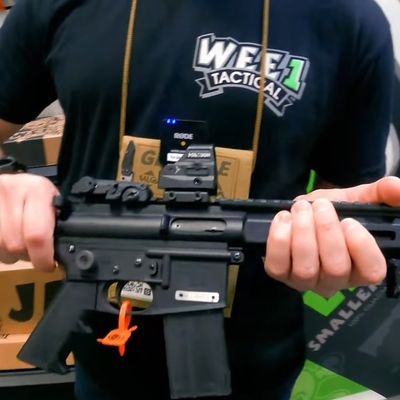
At a gun expo in Las Vegas last January, Eric Schmid, the founder of WEE1 Tactical, demonstrated his company’s first offering: the JR-15, a play on the popular AR-15 assault rifle designed to look just like its deadly cousin, but 20 percent smaller. “It fits the kids really well,” he told a visitor to his booth. “That’ll give them the confidence to hold this thing the way they should have confidence holding it — no drop down in the front trying to manage a weight that’s not right for them. It just fits ’em, fits ’em really well.”
Long guns for kids have been around for years, typically shotguns or single-shot rifles scaled down for a child. But what has attracted so much attention to the JR-15 is its semiautomatic action, firing with each pull of the trigger — along with the image of putting a mini assault rifle in the hands of children in a country where a 6-year-old just shot a teacher in the chest with a handgun legally purchased by his mother. With the JR-15 in production this year and a limited first run of 1,000 rifles being sent to distributors in February, the attention is only going to grow.
The JR-15 is already a small front in the debate among lawmakers over how to stop child gun violence and mass shootings in America. Last July, after Nancy Pelosi showed WEE1’s marketing materials on the House floor, Marjorie Taylor Greene suggested that the children who died at Uvalde should have been armed with JR-15s. “At least they could have defended themselves since no one else did, while their parents were held back by police,” she tweeted.
Democratic lawmakers were especially appalled by WEE1’s advertising strategy and slogan: “Get em one just like yours.” The company’s logo featured skulls with binkies in their mouths, with pigtails for the girl and a mohawk for the boy. “We worked hard on that logo,” Schmid said in a video. “It’s pretty exciting. That keeps the ‘wow’ factor with the kids, I think.” Senators Ed Markey and Dianne Feinstein wrote a letter to the Federal Trade Commission after Uvalde urging the regulator to investigate the marketing. “There is one target market for this dangerous firearm: America’s children,” they wrote.
WEE1 doesn’t seem to disagree. In a statement, the company wrote that the gun is a “youth training rifle” for purchase by adults who want to introduce “hunting and shooting sports to the next generation of responsible gun owners.” In interviews with gun influencers, the company highlights its so-called educational features, including its unique safety mechanism — an extra knob that an adult can turn to override the normal safety switch and stop it from firing. At the gun expo, Schmid compared the feature to a pill bottle: It could stop younger kids, but “your 12-year-olds are going to unlock it real easy.”
The overall safety pitch for gun manufacturers like WEE1 is that when a child is taught how to use a gun under adult supervision, they will be less likely to use it improperly. But some gun-safety advocates doubt the effectiveness of such education. “Gun manufacturers make an AR-15 for adults, but that hasn’t prevented adults who own those rifles legally from in some cases irresponsibly using them, or from them being used in acts of mass violence,” says Dr. Sonali Rajan, a school-violence-prevention expert and faculty member at Teachers College, Columbia University. “My question is: If the AR-15 doesn’t foster safe practices among adults, I’m not sure I follow the logic that leads us to think the JR-15 would foster safe practices among children.”
WEE1, which declined an interview request, also encourages proven safety measures, such as proper storage, and has voluntarily dialed back some of its marketing. The baby skulls with pacifiers are gone, and the company now touts its gun as a “small piece of American freedom.” But with the JR-15 getting into kids’ hands this year at $419 a pop, the controversy isn’t going away. This week, Senator Chuck Schumer urged the FTC again to investigate JR-15’s marketing, which he called a “disgusting and morally bankrupt new low” in gun manufacturing.
The FTC calls, which have not yet resulted in official inquiries, are part of a new front of lawmaker efforts to stop the sale of semiautomatic weapons, which are often used in the deadliest of mass shootings. President Joe Biden continues to call on Congress to pass an assault-weapons ban to help end the churn of mass shootings in America — where 18 people have been killed in two attacks in California in the last week.






























